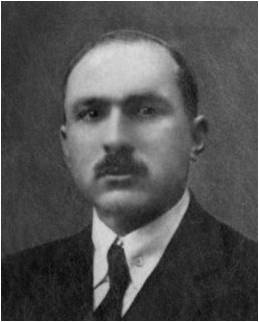The interwar Communist Party of Poland was a communist party active in Poland during the Second Polish Republic. It resulted from a December 1918 merger of the Social Democracy of the Kingdom of Poland and Lithuania (SDKPiL) and the Polish Socialist Party – Left into the Communist Workers' Party of Poland. The communists were a small force in Polish politics.

Józef Adam Zygmunt Cyrankiewicz was a Polish Socialist (PPS) and after 1948 Communist politician. He served as premier of the Polish People's Republic between 1947 and 1952, and again for 16 years between 1954 and 1970. He also served as Chairman of the Polish Council of State from 1970 to 1972.

Henryk Jan Jabłoński was a Polish historian and politician. After 1948, he became a politician of the ruling Polish United Workers' Party, as well as a historian and professor at Warsaw University. He served as head of state of the People's Republic of Poland between 1972 and 1985.

The Polish Socialist Party is a socialist political party in Poland.

Cidadania is a Brazilian political party. It was originally founded as the Popular Socialist Party by members of the former Brazilian Communist Party (PCB), as a centre-left social democratic and democratic socialist party. Despite its left-wing alignment, PPS moved to be opposition against the Workers' Party since 2004, forming alliances with centre-right parties, in particular the Brazilian Social Democracy Party (PSDB), and supporting the Impeachment of Dilma Rousseff. Later the party's National Convention adopted the new naming in March 2019, and it was later approved by the Superior Electoral Court that September. The party then began moving towards a more social liberal position akin to the third way.

Edward Bolesław Osóbka-Morawski was a Polish activist and politician in the Polish Socialist Party (PPS) before World War II, and after the Soviet takeover of Poland, Chairman of the Communist-dominated interim government, the Polish Committee of National Liberation formed in Lublin with Stalin's approval.

The Polish Committee of National Liberation, also known as the Lublin Committee, was an executive governing authority established by the Soviet-backed communists in Poland at the later stage of World War II. It was officially proclaimed on 22 July 1944 in Chełm, installed on 26 July in Lublin and placed formally under the direction of the State National Council. The PKWN was a provisional entity functioning in opposition to the London-based Polish government-in-exile, which was recognized by the Western allies. The PKWN exercised control over Polish territory retaken from Nazi Germany by the Soviet Red Army and the Polish People's Army. It was sponsored and controlled by the Soviet Union and dominated by Polish communists.

Krajowa Rada Narodowa in Polish was a parliament-like political body created during the later stages of World War II in German-occupied Warsaw, Poland. It was intended as a communist-controlled center of authority, challenging organs of the Polish Underground State. The existence of the KRN was later accepted by the Soviet Union and the council became to a large extent subjugated and controlled by the Soviets.

Popular Socialist Party of Mexico is a communist party in Mexico, formed in 1997 after a split from the Popular Socialist Party (PPS).

The Popular Socialist Party was a political party in Mexico. It was founded in 1948 as the Popular Party by Vicente Lombardo Toledano.

The Polish Socialist Party – Revolutionary Faction also known as the Old Faction was one of two factions into which the Polish Socialist Party split in 1906. The Revolutionary Faction's primary goal was to restore an independent Poland, which was envisioned as a representative democracy.

Polish Socialist Party – Left, also known as the Young Faction, was one of two factions into which Polish Socialist Party divided itself in 1906. Its primary goal was transform Poland into a socialist country, established through proletarian revolution, and likely a member of some international communist country.

Kazimierz Pużak (1883–1950) was a Polish politician of the interwar period. Active in the Polish Socialist Party, he was one of the leaders of the Polish Secret State and Polish resistance, sentenced by the Soviets in the infamous Trial of the Sixteen in 1945.

Białystok Voivodeship was a unit of administrative division and local government in Poland from 1944 to 1975, when its purview was separated into eastern Suwałki Voivodeship, Łomża Voivodeship and Białystok Voivodeship (1975–1998). Its capital city was Białystok. The establishment of Podlaskie Voivodeship in 1999 was essentially a reunion of the areas of Białystok Voivodeship (1945–1975).
The Pirate Party Switzerland is a political party in Switzerland, based on the model of the Swedish Pirate Party. The party was founded on 12 July 2009 in Zürich, by about 150 people. By the end of February 2012, the PPS had around about 1,800 members.

Polish Socialist Party – Freedom, Equality, Independence often referred to simply as Militia PPS-WRN, was a Polish underground paramilitary formation of the Polish Socialist Party – Freedom, Equality, Independence active during the occupation of Poland by Nazi Germany and the Soviet Union in World War II between 1939 and 1945. The total number of clandestine members of MR PPS-WRN reached 30,000 at the time of the Soviet counter-offensive of 1944. They participated in both Operation Tempest against the Nazis and in the Warsaw Uprising of 1944. MR PPS-WRN was created in November 1939 amongst the prewar labour circles in Warsaw, Radom, Kraków, in Upper Silesia (Śląsk) and in the Dąbrowa Basin (Zagłębie) mainly for self-protection. It was supposed to help recreate the Polish prewar police and counter—intelligence services.
Jorge Cruickshank García was a Mexican politician. He was the general secretary of the Popular Socialist Party and a five-time parliamentarian.
The Sammarinese People's Party (PPS) was a Christian democratic political party in San Marino, forerunner of the current Sammarinese Christian Democratic Party, and counterpart of the Italian People's Party.













